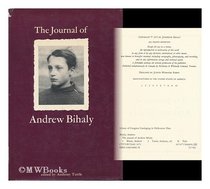This is the book description from the inside flap: Andrew Bihaly lived on the Lower East Side of Manhattan in the late 1960s. His journal was written from 1966 through 1968 and during tht time, he wrote about hsi life, a life which was profoundly darkened by his past. In 1944, at the age of nine, Andrew was sent by his mother to a monastery in his native Hungary to protect him from the Nazis, and there he was brutalized by a gang of delinquents. From this atrocity and the horrors of the war (his father was murdered on the Eichmann Death March) his psyche ws shattered, and once in America he was trying desperately to put the pieces back together to become whole. In a corrpu and incomprehensible society, he ws destroyed: he committed suicide in the fall of 1968.
To support himself, he worked as a waiter for the metropolian Museum of Art, and later, when fired, took odd jobs and begged. He chose to live honestly, to live a feeling life where he was loved and helped others. Yet, whenever he began a relationship with a girl, spending nights of great passion and tenderness with her he was drawn closer to his mother's debilitating love, to the confusing freedom of the Aquarian Age and the terrors of the monastery in Visegrad, and there was Alfred, his upstairs neighbor, a black man, a hustler, and his friend, who embodies a kind of evil that is both banal and terrifying.
From the past he endured, the present he tried to forget, and the dreams he held, the microcosm of Andrew's journal becomes a deeply moving portrait of the tinmes we are all alive in and brilliantly reflects their loneliness, their joys and bewilderng terrors.
The writing has a rare smplicity and purity. The journal will invite comparisons to the Diary of Anne Frank.
To support himself, he worked as a waiter for the metropolian Museum of Art, and later, when fired, took odd jobs and begged. He chose to live honestly, to live a feeling life where he was loved and helped others. Yet, whenever he began a relationship with a girl, spending nights of great passion and tenderness with her he was drawn closer to his mother's debilitating love, to the confusing freedom of the Aquarian Age and the terrors of the monastery in Visegrad, and there was Alfred, his upstairs neighbor, a black man, a hustler, and his friend, who embodies a kind of evil that is both banal and terrifying.
From the past he endured, the present he tried to forget, and the dreams he held, the microcosm of Andrew's journal becomes a deeply moving portrait of the tinmes we are all alive in and brilliantly reflects their loneliness, their joys and bewilderng terrors.
The writing has a rare smplicity and purity. The journal will invite comparisons to the Diary of Anne Frank.




